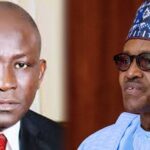Nigerians don’t need bank accounts – EFCC

Due to the increased number of bank frauds and insider crimes in the banking sector, the Economic and Financial Crimes Commission (EFCC) maintains it is not mandatory for Nigerians to hold bank accounts.
The EFCC also opposed the idea of opening bank accounts based solely on phone numbers, claiming that roughly 40% of Americans don’t have bank accounts.
Bawa Usman, zonal head of the EFCC in Sokoto made the statement on Tuesday at a roundtable with compliance officers of commercial banks.
Read Also: ‘My Boyfriend Appreciates The Fact That I Can Not Get Pregnant For Him’ – Bobrisky
He said; “Nearly 40 per cent of Americans do not have accounts. So, it is not very compulsory for everybody in Nigeria to have a bank account.”
According to Usman, whose zone covers Sokoto, Kebbi, and Zamfara, insiders facilitate most financial frauds in the banking industry.
The commission convened the meeting to strengthen the relationship and collaborations between the EFCC and the banks in tackling frauds.
The EFCC boss further said the banks often frustrated the EFCC’s investigations as they delayed replying to its letters.
Read Also: Widowed petty trader weeps after thief stole her carton of fish in Benue
“Such delays jeopardise our investigation. Financial institutions must collaborate with us toward curtailing money laundering, illegal financing, and other illicit flows of money.
“The meeting is a response to the directive of the EFCC leadership. It is one of numerous strategies toward fighting all manners of corruption.
“The commission strives to ensure that fraudsters do not get away with proceeds of crimes undetected. To achieve this, we are appealing to all banks to facilitate a better working relationship with the anti-graft agency,” he explained.
He urged bankers to improve ways of tracking illicit finances and transactions, stressing that point of service operators or money agents needed to be well-informed on financial regulations.
Usman told the banks to ensure that eligible customers obtain Special Control Unit Against Money Laundering (SCUML) numbers, stressing the need to review their data registers to ensure compliance.





Leave a Reply